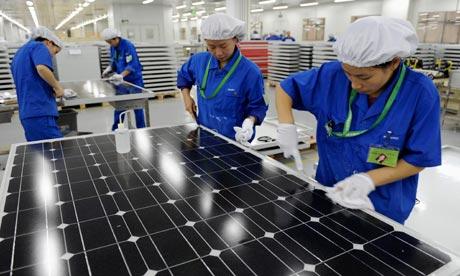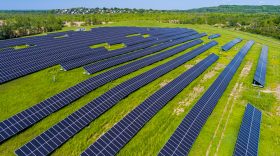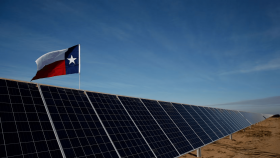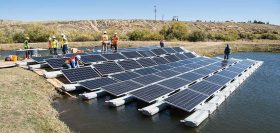Will solar fall victim to protectionism?
Chinese solar panels, along with steel, aluminum and consumer electronics, may soon be subject to tariffs designed to protect US industries from what the Trump administration believes are unfair Chinese trade practices. The question in the minds of many experts is, will responding to the problem with tariffs really help US companies, or might they bring about retaliation from China worse than the problem itself? A flurry of articles from a range of business journals and respected news sources are trying to make sense of how a trade war with China might play out.
China is America’s biggest trading partner and accounts for about 50% of the US trade deficit. Obviously, any sweeping changes to trade policies that alienate the Chinese could create ripple effects throughout the nation’s economy. Jim Cramer, investment strategist and host of the CNBC program Mad Money, is concerned.
“We’re at a major crossroads when it comes to trade policy in this country, and I think you need to seriously consider the protectionist course of action before you decide to buy international stocks with foreign exposure,” the “Mad Money” host said.
Scott Lincicome, an adjunct scholar and former trade analyst for the libertarian Cato Institute writes that unilateral trade action on the part of the United States could trigger backlash not only in relations with China, but that negative effects could be far more far-reaching.
“…other WTO Members would likely join China in condemning the United States’ chest-thumping unilateralism, perhaps even joining in on the underlying WTO dispute challenging the overall lawfulness of Section 301. So, in one fell swoop, the Trump administration could expose its exporters to WTO-consistent foreign retaliation, kill the remaining legitimacy of Section 301, and paint the United States as a global scofflaw (and China as the law-abiding victim). That’s a trifecta of bad, totally-avoidable outcomes. “
Cramer’s comments were focused on steel and aluminum imports an Lincicome was referring specifically on intellectual property issues arising around the consumer electronics marketplace, but the same concerns apply when discussing the possibility of imposing tariffs on solar panels.
The Origins of the solar tariff proposal: Suniva
Solar cell manufacturer Suniva, which declared bankruptcy in April of 2017, requested relief from Chinese competition under Section 201 of the Trade Act of 1974, which was designed to protect American businesses from dumping low-cost products on the U.S. market. A report issued by the Trump administration the previous month had promised a more aggressive approach to unfair international trade practices, including expanded use of Under Section 201.
Because Chinese manufacturers of solar panels have flooded American markets with panels at prices too low for U.S. manufacturers to compete, Suniva filed a petition with the Trade Commission seeking “… a recommendation to the President of four years of relief of an initial duty rate on cells of $0.40/watt, along with an initial floor price on modules of $0.78/watt. Petitioner also seeks other equitable remedies that will effectively assist the domestic industry to make a positive adjustment to import competition. Finally, petitioner seeks a recommendation from the Commission to the President that the United States negotiate with trading partners to address the global supply imbalance and overcapacity in CSPV cells and modules.” This will “…allow the domestic industry to survive long enough that it can benefit from actions of the U.S. government, and foreign governments and producers to address the massive excess global capacity that has depressed global CSPV cells and modules prices to unsustainable levels.”
Not long after Suniva’s action, another bankrupt American manufacturer, SolarWorld, signed on to the action. In September, members of the Trade Commission voted unanimously in favor of the Suniva/Solarworld petition, opening the door for the President to impose tariffs. Ironically, although Suniva and SolarWorld are both located in the United States, they are both owned by foreign parent companies… SolarWorld is a German company and Suniva is owned by a company from… you guessed it…China.
According to the Solar Energy Industry Association (SEIA), the chilling effect caused by a shortage of cheap Chinese solar panels could cost the American solar business 88,000 installation jobs, while saving only 2,000 manufacturing jobs. Suniva and SolarWorld’s downfall was the result of insufficient production capacities and a “series of damaging business decisions that had absolutely nothing to do with imports,” according to an SEIA report. According to Abigail Ross Hopper, CEO of the SEIA;
“They did not make a product that could compete at the utility scale, where 80 percent of solar market growth has been, effectively icing themselves out of the biggest and fastest growing part of the market…On the residential solar side, they didn’t align themselves with some of the biggest residential developers.”
Solar industry mobilizes, calling for free trade
The response by every sector of the solar industry (other than the two failed manufacturing companies) has been united in calling on the President to reject the idea of a tariff on Chinese panels. Not only will installation companies be effected, but even other, successful American manufacturers would be hurt by a reduction in demand, lack of raw materials, and more expensive components.
SEIA and its members have set forth a plan for encouraging a free market in solar that does not include bail-outs for failed companies. It includes:
- Step 1: Say No to Solar Tariffs – These taxes on industry will raise electricity prices, kill jobs and bring an American economic success story to a halt.
- Step 2: Support our Military and National Security – Take a strong stand for the military by keeping the costs of solar down. Our fighting forces need solar in the battlefield and use solar on domestic bases today. Solar helps ensure mission success.
- Step 3: Ensure U.S. Energy Dominance – Do not cede world leadership in solar power production. Listen to a broad but unified coalition of energy producers, conservative groups and American businesses large and small, which all see solar investment as giving them an edge.
- Step 4: Fight for American Workers and Don’t Turn Off This Economic Engine – Today, solar is a force in America’s economy. Keep the booming solar market going strong and offering well-paying jobs.
- Step 5: Don’t Bail Out Failed Foreign Firms – You will be helping millionaires in China and Germany, and investors in Qatar and Europe, rather than the American families that have built this booming American industry. Don’t let two foreign-based, bankrupt companies manipulate U.S. law for a bailout.
- Step 6: An America First Plan for Solar – If you believe those firms need assistance, create a plan that would support further investment in U.S. manufacturing, not just bail out foreign investors. Say no to traditional tariffs and quotas, and use American innovation – such as an import license fee that will get hundreds of millions of dollars in direct investment help to U.S. companies and our economy.
Conservatives speak out against tariffs
“Taxpayers should not have to bail out one foreign-owned company only for their foreign financers to get another. American solar can compete just fine on its own.” – Sean Hannity
It’s not often that Sean Hannity agrees with environmentalists. It’s even rarer that fossil fuel insiders like the Koch brothers do, too. But the Heritage Foundation and the Koch’s American Legislative Exchange Council (ALEC) have come out against the tariffs on imported crystalline silicon solar products as well, joining in a coalition with the SEIA and others to form The Energy Trade Action Coalition (ETAC). The members may not agree on a lot of things, but they do agree that we are in a global economy, and that archaic ideas about protectionism are more likely to hurt the American economy than to help it. The coalition makes for strange bedfellows, but chances are, powerful conservatives have a much better chance of being heard than do solar advocates.
Wait and see…
right now, there is a lot of buzz surrounding the White House plans to address Chinese trade policy, but there is very little information coming out on what those plans might be. The bottom line for consumers is, there may be a lot of solar customers who want to buy panels now and hedge their bets, just in case the price goes up in the months to come.






